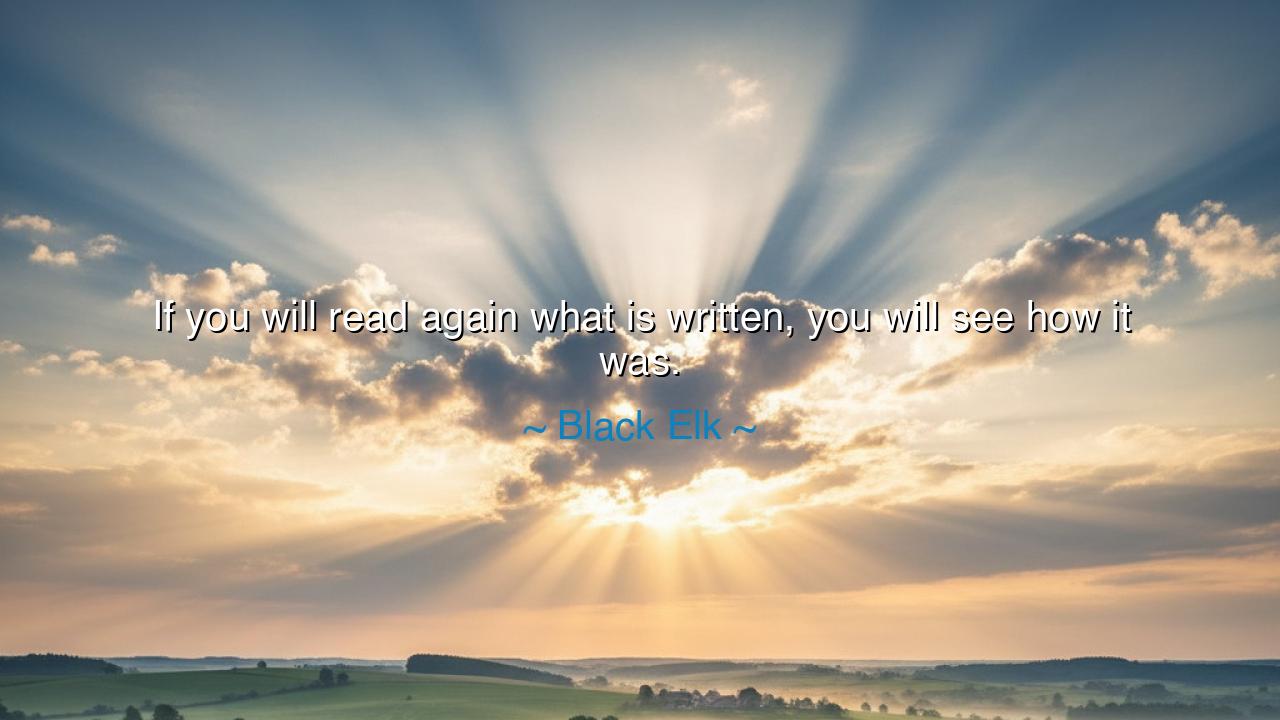
If you will read again what is written, you will see how it was.






“If you will read again what is written, you will see how it was.” Thus spoke Black Elk, the holy man of the Oglala Lakota Sioux, whose visions and memories became one of the most profound testimonies of the Native American spirit. These words were spoken near the end of his life, to the writer John G. Neihardt, who recorded his visions in Black Elk Speaks. In this simple yet mysterious statement, Black Elk offers more than an invitation to reread a story — he gives a key to understanding truth through remembrance, to seeing with the heart what words alone cannot contain. For what he describes is not merely history, but the living spirit of the past, which still breathes within those willing to look deeply.
When Black Elk says, “If you will read again what is written,” he calls the listener to contemplation. He knew that to truly see, one must read not only with the eyes, but with the soul. To read “again” is to look beyond the surface — to understand that words are but footprints pointing toward experience, and that meaning unfolds only to those who return to the text with patience and reverence. And when he says, “you will see how it was,” he is not speaking merely of facts or events, but of the truth behind them — the sacred reality of a world that has passed yet still endures in memory.
The origin of this quote lies in a moment of reflection. Black Elk had told his story — of visions received in youth, of battles fought, of the suffering of his people, and of the fading of the old ways. When he uttered these words, it was as if he were entrusting his truth to the written page, knowing that future generations would no longer walk the plains or hear the drums of his people. He was asking that they read again — that they not take his words as legend or nostalgia, but as living witness, as a bridge to a time when the world was more connected to the sacred. For the written word, when read with understanding, has the power to resurrect the past, not in flesh, but in spirit.
Consider what he was asking us to see. He had witnessed the fall of the Lakota nation, the slaughter at Wounded Knee, and the breaking of treaties that had promised peace. He had seen his people’s buffalo vanish, their ceremonies outlawed, their dreams dismissed as superstition. And yet, through all this sorrow, he carried within him a vision of unity — of the sacred hoop of the world, where all nations and creatures live in harmony. When he said, “you will see how it was,” he was asking the future to bear witness — to see not only what was lost, but what was holy in that way of life, what wisdom still waits to be understood.
The meaning of his words reaches far beyond his own people. They speak to all who wish to understand their own histories — for every culture, every heart, carries stories that risk being forgotten. In an age where speed replaces reflection, and noise drowns out remembrance, Black Elk’s wisdom calls us to read again, to return to the sources of our humanity. History is not dead; it sleeps, waiting for eyes that can see and hearts that can feel. The truth of a people, or of an individual life, can only be known by those who return again and again to listen — until the written word becomes the living voice of experience.
There is a story from another age that mirrors Black Elk’s insight. When the philosopher Plato wrote of the lost city of Atlantis, many dismissed it as myth. Yet for centuries, readers have returned to those pages, seeking not a map, but meaning — the moral of pride, decay, and loss. So it is with Black Elk: he does not ask us to find a vanished land, but to see how it was — to rediscover the harmony, the reverence, and the spiritual vision that once united his people with the Earth. His words remind us that sacred truths can be found again, but only by those who are willing to read — and to see — with more than intellect alone.
So, my children, learn from this teaching: read again — your history, your ancestors’ stories, your own heart. For the first reading gives knowledge, but the second gives understanding. The first shows the surface, but the second reveals the soul. Do not rush to move forward without first seeing clearly what has been left behind. For the past is not a chain to bind you, but a compass to guide you.
And thus, remember the wisdom of Black Elk, who spoke to all ages: “If you will read again what is written, you will see how it was.” To see how it was is to awaken to how it still is — for the spirit of the Earth, the pain of loss, and the dream of harmony still call to us through the written word. Read deeply, remember truly, and you will not only see the past — you will see your place within the great circle of life, where all things are connected, and nothing, once truly seen, is ever lost.






AAdministratorAdministrator
Welcome, honored guests. Please leave a comment, we will respond soon